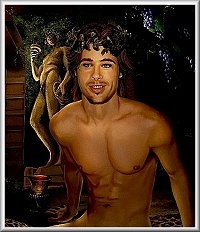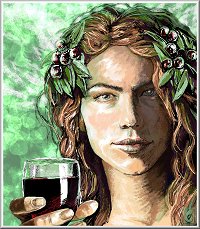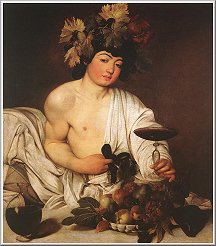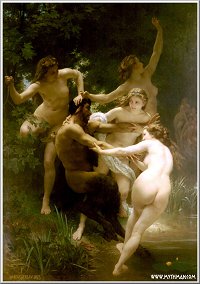
Dionysus God of Wine
CLICK TO ENLARGE

Dionysus
by Janice Duke
CLICK TO ENLARGE

Bacchus by Caravaggio
CLICK TO ENLARGE

Nymphs & Satyr
CLICK
TO ENLARGE
|
DIONYSUS PAGE FOUR
continued from page three
There is a reason that donkeys are sacred to Dionysus and he is
often portrayed sitting astride an ass. When goddess Hera had
thrown him into a state of madness, he wandered about
through many countries of the earth.
Dionysus was made to travel to an oracle at Dodona to receive
instructions as to the next step in his journey, but on his way
there he came to a lake, so deep and wide that he was prevented
from proceeding any further.
One of two asses (donkeys) he met there at the lake were willing
to carry the god of wine across the water, and the grateful god
placed both animals among the stars. Henceforth donkeys remained
sacred to Dionysus.
Similarly, when Dionysus arrived at the Euphrates river, he
built a bridge to cross it, but Zeus sent a tiger to instead
carry him across the river Tigris.
No matter where Dionysus and the frenzied host of Pans, Satyrs,
and Maenads went, they easily conquered any enemies foolish
enough to stand up to such a spirited army.
The invaders would teach the natives the cultivation of the vine
and of various fruits, and would introduce to them the worship
of the Olympian gods.
Dionysus and his army would also establish towns wherever they
went, would institute laws, and leave behind a legacy of
buildings, temples, pillars and monuments.
Without exception, the conquered land and its people would be
happy at this conqueror who had civilized them and brought such
a precious gift. Consequently, Dionysus would be worshipped as a
major god in these new lands.
The festival for Dionysus was in the spring when the leaves
begin to reappear on the vine. It became one of the most
important events of the year, with its focus becoming the
theater.
Most of the great Greek plays were initially written to be
performed at the feast of Dionysus. Those who took part,
including writers, actors and spectators, were regarded as
sacred servants of Dionysus during the festival.
As far as the nature and origin of the god Dionysus is
concerned, he appears in all traditions as the representative of
some power of nature, whereas Apollo is mainly an ethical deity.
Dionysus is the productive, overflowing and intoxicating power
of nature, which carries an ordinarily serious man away from his
usual quiet and sober mode of living and inspires him to do
things he wouldn't otherwise consider.
Wine is the most natural and appropriate symbol of that power,
and it is therefore called "the fruit of Dionysus." (Dionusou
karpos) by the ancient Greeks.
Dionysus is the Greek god of wine, the inventor and teacher of
its cultivation, the giver of joy, and the disperser of grief
and sorrow all at once.
As the god of wine, he is also both an inspired and an inspiring
god, that is, a god who has the power of revealing the future to
man by oracles. Thus, it can be said that Dionysus had as great
an influence on the Delphic oracle as Apollo, god of prophecy,
and he himself had an oracle in Thrace to guide the ancients.
Since prophetic power always goes hand in hand with the healing
arts, Dionysus and his oracle of Amphicleia, in the region of
Phocis, cured diseases by revealing the remedies to the
sufferers in their dreams. Hence Dionysus was considered a
savior god against raging diseases.
Since he was the cultivator and protector of the vine, it
followed that Dionysus was also the guardian of trees in
general, giving him a close connection to Demeter, goddess of
the harvest.
His connection to Demeter is further reinforced by the notion of
his being the promoter of civilization, a law-giver, and a lover
of peace, as Dionysus did throughout his faraway journeys.
It is interesting to note that in the earliest times the Graces,
or Charites, were the companions of Dionysus, and at Olympia he
and the Charites had an altar in common.
In the course of time a great change took place in the mode of
his worship, for afterwards we find him accompanied on his
expeditions and travels by Bacchantic women, all of whom are
represented in works of art as raging with madness or
enthusiasm.
These frenzied women in the god of wine's entourage were
portrayed as being in vehement motions, their heads thrown
backwards, with disheveled hair, and carrying in their hands
thyrsus-staffs (entwined with ivy, and headed with pine-cones),
cymbals, swords, or serpents.
Sileni, Pans, Satyrs, Centaurs, and other fantastical beings
were also the constant companions of Dionysus, completing the
mad picture.
The Romans called him Bacchus.

[home] [page
one] [page two] [page
three] [page four]
|







